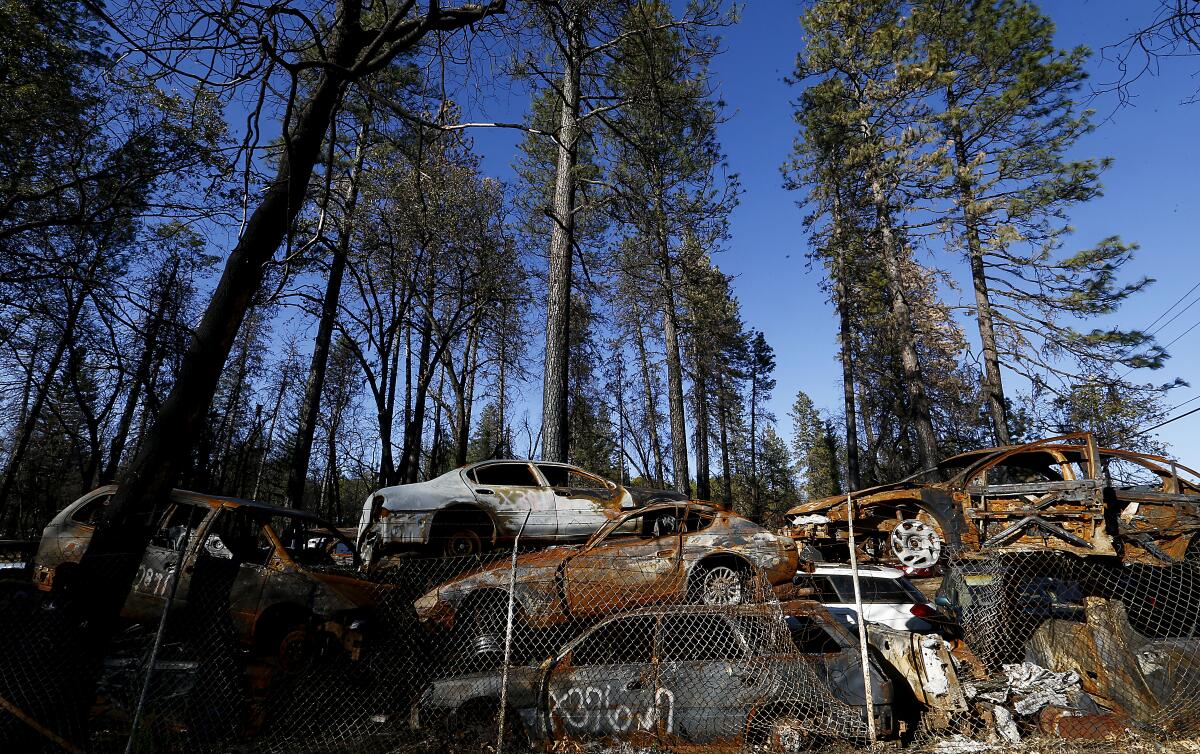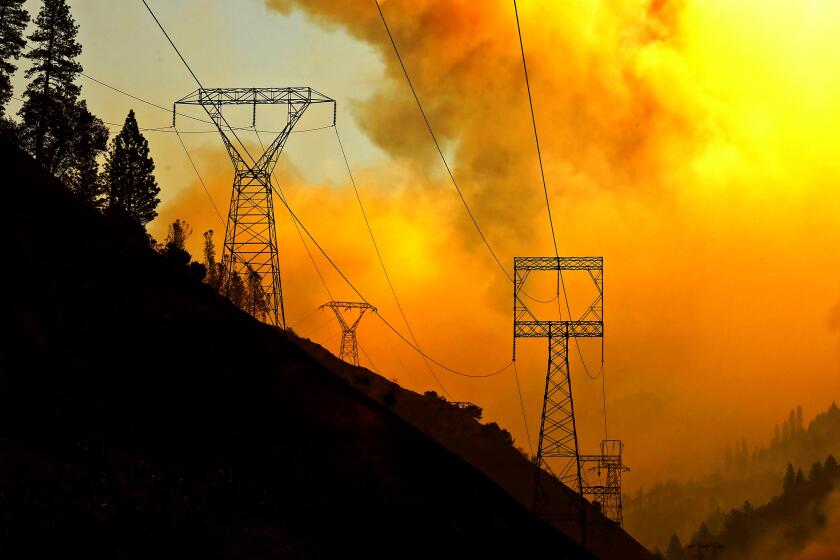Court says California utilities commission must obey state Public Records Act

- Share via
SAN FRANCISCO — In a broad victory for government transparency, an appeals court has ruled that the California Public Utilities Commission must comply with a state law requiring all agencies to promptly release information to the public.
In a unanimous decision issued Friday, a three-judge panel of the 1st District Court of Appeal in San Francisco said the commission’s lengthy and open-ended administrative procedures violate the strict timelines of the California Public Records Act.
The ruling could bring more accountability to the commission, which has faced criticism of excessive secrecy and ineffectiveness, advocates said. It regulates corporations ranging from utilities to ride-hailing services.
The commission had claimed that a century-old law — intended to prevent abusive litigation by railroad barons fighting regulations — required people requesting records to undergo a convoluted administrative process before they could sue the agency to compel the release of public records.
Citing that section of the Public Utilities Code, the agency over the years has blocked requests for records on its handling of disasters such as Pacific Gas & Electric Co.’s Camp fire, the failed San Onofre nuclear power plant and thousands of collisions and assaults on Uber and Lyft rides.
But the court roundly rejected the agency’s argument, holding that the procedures set forth in the utilities code “do not apply to the PRA,” or Public Records Act.
“[T]he procedural scheme, and specifically the rehearing process, set forth in the Public Utilities Code is not only entirely different than, it is at odds with, the procedural provisions of the PRA and the Legislature’s intent in enacting them,” the court said.
More widely, the court said “any” administrative process that state and local agencies adopt to handle records requests “must comply with the language and purpose of the PRA.” If agencies fail to complete their internal reviews within the deadlines of the records act, it said, requesters may seek court review without further delay.
But the court also held that the specific records requested in this case — correspondence between the commission and the governor’s office concerning the devastating 2018 Camp fire — were confidential and need not be released.
Citing prior holdings on similar records, the court said releasing the governor’s correspondence with the commission would interfere with the ability of government officials to speak frankly.
The CPUC has multiple barriers to prevent the public from learning about its handling of deadly disasters and corporate scandals, an investigation found.
David Snyder, executive director of the First Amendment Coalition, a nonpartisan organization that advocates for government transparency, said that although the court found the governor’s correspondence to be confidential, the ruling was an important advance.
“The decision is a real win for transparency,” said Snyder, whose organization joined with the Associated Press and the Center for Investigative Reporting in supporting the lawsuit. They had filed a brief in the case that said the commission has a history of “unlawful delays” in responding to requests.
“The court has made clear that an agency’s administrative procedures can’t trump the Public Records Act, and that an agency like the PUC cannot indefinitely delay processing a public records request,” Snyder said.
Terrie Prosper, the commission’s director of news and outreach, and Christofer Nolan, a lawyer representing the agency in the case, did not respond to emails seeking comment.
Steve Zansberg, the Denver attorney who filed the lawsuit on behalf of television station ABC-10 in Sacramento and its reporter Brandon Rittiman, said his clients were gratified that the decision will make it easier for people to seek judicial review in cases where the agency delays or denies their requests.
“No one should have to wait, as did my clients, for months and months to be able to ask a court to review that agency’s decision to deny records access,” he said in a statement.
As the court put it, “The delay that occurred here was egregious by any measure.”
On Nov. 19, 2020, Rittiman requested copies of communications between Marybel Batjer, president of the commission at the time, and Gov. Gavin Newsom’s office concerning the Camp fire. The Butte County blaze destroyed 18,000 structures and killed at least 85 people. PG&E pleaded guilty to 84 counts of involuntary manslaughter and one of causing the fire.
Rittiman was investigating why the agency waived a $200-million fine against PG&E and whether the governor’s office influenced that decision.
The agency said the records were confidential; Rittiman filed an administrative appeal. When seven months had passed and the agency had made no decision, Rittiman sued, the court noted.
The agency then sought to get his case dismissed because he had not completed its administrative process, but the state Supreme Court ordered a review.
The commission has long maintained that those requesting records could not sue it for failing to comply with the PRA until they underwent two internal administrative appeals of their claim. As its legal basis, the agency cited the 100-year-old law intended to prevent abusive litigation by railroad interests.
But as the lawsuit noted, the agency’s appeals system provided no deadline, allowing it to indefinitely delay its decisions on whether to release records, despite the PRA requirement that agencies decide within 24 days. In this way, the agency prevented people from having a court independently review their cases, even as their requests languished at the agency.
Enacted in 1968, the California Public Records Act is modeled on the federal Freedom of Information Act. The state law declares that “access to information concerning the conduct of the people’s business is a fundamental and necessary right.”
It says all state agencies “shall” determine whether the requested records are releasable within 24 days, immediately notify the requester and “promptly” release them. If an agency withholds records, it says, the requester may seek court review “at the earliest possible time.”
Voters reinforced the law in 2004 when they overwhelmingly passed Proposition 59, which embedded similar words in the state Constitution.
The commission, too, has roots in a voter-backed constitutional amendment. The agency was created in 1879 as the Railroad Commission but was corrupted by the Southern Pacific Railroad, says a history written by commission staff. In 1911, voters following Gov. Hiram Johnson’s reform platform granted the agency greater autonomy with the intent of insulating it from undue influences. Its authority was extended to other utilities, and in 1946 it was renamed.
The agency is led by five commissioners appointed by the governor to six-year terms. They oversee 1,402 employees and a $1.1-billion budget.
The commission’s policy on records requests — known as General Order 66-D — says requesters must complete the internal administrative reviews before they can seek judicial review of the agency’s withholding of records.
But the court concluded that just as the Legislature had used its “plenary” power to pass the public utilities code of the early 20th century, it used the same sweeping authority in 1968 to pass the records act, which it clearly intended to apply to the commission.
The court declared that “the PRA fixes the bounds” of the commission’s authority to adopt internal procedures for records requests. The agency’s open-ended process, it said, “cannot be squared” with the records act’s much tighter timeframe.
“In short, the PRA calls for the handling of record requests and the resolution of disputes over such requests with alacrity,” the panel said, and permits requesters to sue to enforce the act.
“The PUC has for so many years operated in a black box,” said the First Amendment Coalition’s Snyder. “The public has not had as much access to its inner workings. Hopefully this will open the door, at least a bit, to greater transparency and, thus, greater accountability for the Public Utilities Commission.”
Seth Rosenfeld writes for the San Francisco Public Press, an independent nonprofit newsroom that produces investigative and solutions journalism. For more of its coverage on this topic, see Ride Hailing’s Dark Data. This story was produced in partnership with the McGraw Center for Business Journalism at the Craig Newmark Graduate School of Journalism at the City University of New York. Support also came from the Fund for Investigative Journalism.
More to Read
Sign up for Essential California
The most important California stories and recommendations in your inbox every morning.
You may occasionally receive promotional content from the Los Angeles Times.














